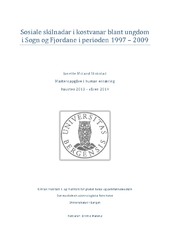| dc.contributor.author | Stokstad, Janette Moland | en_US |
| dc.date.accessioned | 2014-07-16T09:08:25Z | |
| dc.date.available | 2014-07-16T09:08:25Z | |
| dc.date.issued | 2014-05-15 | eng |
| dc.date.submitted | 2014-05-15 | eng |
| dc.identifier.uri | https://hdl.handle.net/1956/8163 | |
| dc.description.abstract | Social disparities in health follow a gradient through the whole population, the social gradient in health. People with higher education, better occupational status and income live on average longer lives and have better health than those with lower education, higher occupational status and income. The social gradient in health is a fact and is evident in every country worldwide, independent of gross national product. In this thesis have explored social disparities in adolescents eating habits among high school students in the county of Sogn og Fjordane in Norway during the period 1997-2009. We have explored the social disparities between adolescents with different living environments, educational programs, family structures and levels of parental academic level. For each of these four social areas we have examined whether social disparities existed in healthy eating habits, unhealthy eating habits, breakfast eating and weight cycling. We also explored whether these differences persisted over time. Based on Michel Marmot's psychosocial theory, we examined if psychosocial factors mediated the social differences in eating habits. In addition to this, based on Everett Rogers' theory diffusion of innovations, we also explored how these eating habits in general altered over time. The data was collected in four separate cross-sectional surveys in the health project Health, environment and lifestyle in high school students. Statistical analyses were carried out in the statistical program IMB SPSS. The results showed that in almost all cases there were significant social disparities and that these disparities persisted throughout the whole survey period. Psychosocial factors did not mediate the social differences in eating habits. In general, both the healthy and the unhealthy eating habits altered in a positive way, resulting in an overall more healthy diet. Breakfast habits remained the same throughout the survey period, whereas the weight cycling trends changed in a negative direction in regards to health, with an increasing prevalence over time. The results are of importance for improving present and future health interventions aimed for adolescents. | en_US |
| dc.description.abstract | Sosiale skilnadar i helse dannar ein gradient gjennom heile befolkninga, den sosiale helsegradienten. Dei med lengst utdanning, høgst yrkesstatus og best inntekt lever i snitt lenger og har betre helse enn dei med kortare utdanning, lågare inntekt og yrkesstatus. Den sosiale gradienten er eit faktum i alle verdas land, uavhengig av brutto nasjonalprodukt. I denne oppgåva har vi undersøkt sosiale skilnadar i kostvanar blant ungdom på tre vidaregåande skular i Sogn og Fjordane i perioden 1997-2009. Vi har undersøkt om det er sosiale skilnadar i kostvanar mellom ungdomar med ulike buforhold, ulike utdanningsløp, ulik familiesituasjon og foreldre med ulikt utdanningsnivå. For kvar av desse sosiale grupperingane har vi undersøkt om det eksisterer sosiale skilnadar i sunne kostvanar, usunne kostvanar, frukostvanar og vektendringsmønster. Vi har òg undersøkt om dei sosiale skilnadane endra seg over tid. Med utgangspunkt i den psykososiale forklaringsteorien til Michael Marmot undersøkte vi om sosiale skilnadar er mediert av psykososiale faktorar. I tillegg undersøkte vi, med utgangspunkt i Everett Rogers sin diffusjonsteori, den generelle utviklinga av kostvanar i ungdomspopulasjonen i denne tidsperioden. Datamaterialet som ligg til grunn er samla inn i fire separate tverrsnittundersøkingar i prosjektet Helse, miljø og livsstil blant elevar i videregåande skular. Dataa frå undersøkingane er behandla i dataprogrammet IMB SPSS. Resultata syner at det i nær alle dei undersøkte tilfella eksisterte signifikante sosiale skilnadar i ungdomane sine kostvanar som vedvara gjennom heile undersøkingsperioden. Psykososiale faktorar medierte ikkje dei sosiale skilnadane i kostvanane. Generelt utvikla sunne og usunne kostvanar seg i ei positiv retning til eit meir helsesamt kosthald. Frukostvanane var stabile og uendra, medan hyppige vektendringar vart vanlegare. Funna er av betyding for arbeidet med å sikra gode og effektive helseintervensjonar retta mot ungdom. | en_US |
| dc.format.extent | 2341239 bytes | eng |
| dc.format.mimetype | application/pdf | eng |
| dc.language.iso | nno | eng |
| dc.publisher | The University of Bergen | eng |
| dc.subject | Sosiale ulikheter | eng |
| dc.subject | Sosiale skilnadar | eng |
| dc.subject | Miljø | eng |
| dc.subject | Livsstil | eng |
| dc.subject | Kostvaner | eng |
| dc.subject | Kosthold | eng |
| dc.subject | Ungdom | eng |
| dc.subject | Vektendring | eng |
| dc.subject | Psykososial helse | eng |
| dc.subject | Ernæring | eng |
| dc.subject.mesh | Adolescent | eng |
| dc.subject.mesh | Socioeconomic Factors | eng |
| dc.subject.mesh | Food Habits | eng |
| dc.title | Sosiale skilnadar i kostvanar blant ungdom i Sogn og Fjordane i perioden 1997 - 2009 | en_US |
| dc.type | Master thesis | |
| dc.rights.holder | Copyright the author. All rights reserved | |
| dc.description.degree | Master i Human ernæring | |
| dc.description.localcode | MAMD-NUHUM | |
| dc.description.localcode | NUHUM395 | |
| dc.subject.nus | 759999 | eng |
| fs.subjectcode | NUHUM395 | |
